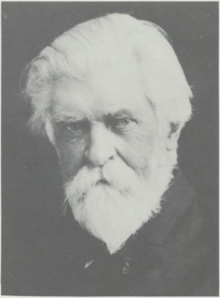William Phipps Blake | |
|---|---|
 | |
| Born | June 1, 1826[1] New York, New York |
| Died | May 22, 1910 (aged 83) Berkeley, California |
| Education | Yale University, 1852 |
| Occupation(s) | Geologist, educator |
| Spouse |
Charlotte Haven Lord Hayes
(m. 1855; died 1905) |
William Phipps Blake (June 1, 1826 – May 22, 1910) was an American geologist, mining consultant, and educator. Among his best known contributions include being the first college trained chemist to work full-time for a United States chemical manufacturer (1850), and serving as a geologist with the Pacific Railroad Survey of the Far West (1853–1856), where he observed and detailed a theory on erosion by wind-blown sand on the geologic formations of southern California, one of his many scientific contributions. He started several western mining enterprises that were premature, including a mining magazine in the 1850s and the first school of mines in the Far West in 1864.
From the 1850s on he published over 200 articles, several books, and numerous newspaper and mining magazine columns or short pieces on mining and geology. He served throughout his long career as a mining consultant for mining corporations in every western state and several foreign countries, including Japan. He also served as special ambassador for the nascent science of geology while serving as the United States' principal geologic exhibit commissioner for what now would be called World Fairs, from Paris in 1867, through Vienna and the centennial at Philadelphia, back to Paris in 1878. He ended his long and distinguished career as head of the school of mines at the University of Arizona, 1895–1905, remaining in an active emeritus status until his death.